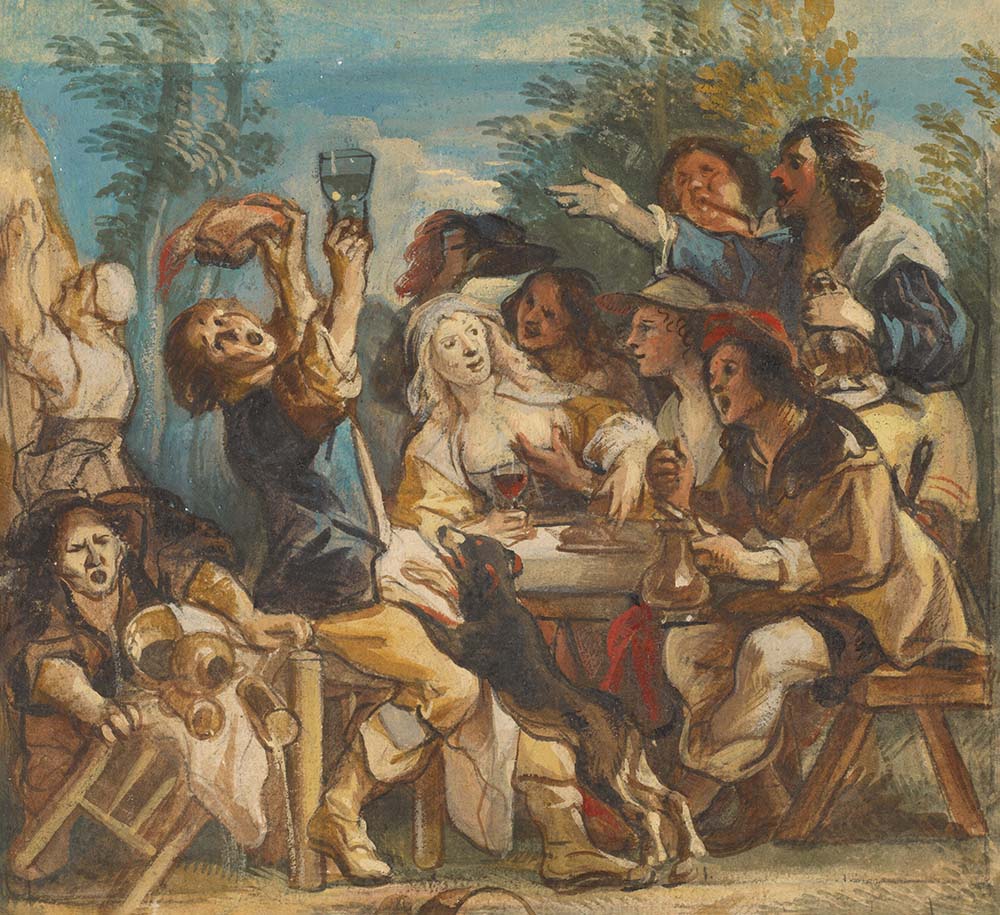
Portrait of a Couple, c. 1580. The Cleveland Museum of Art, Holden Collection, 1916.
When the London newspaper the Athenian Mercury, edited and published by the author and bookseller John Dunton, first answered questions about romance, bodily functions, and the mysteries of the universe in 1691, it may have created the template for the advice column. But the history of advice stretches back even further into the past. Advice—whether unsolicited, unwarranted, or desperately sought—appears in ancient philosophical treatises, medieval medical manuals, and countless books. Lapham’s Quarterly is exploring advice through the ages and into modern times in a series of readings and essays.
Giovanni Della Casa was born into a wealthy Tuscan family and lived in Florence and Rome around the same time as Michelangelo. He studied law at the University of Bologna until drawn away by his passion for poetry and the classics. Seeking a prestigious and comfortable profession, he began a career in the church around 1530, serving Pope Paul III at the Vatican. He seems to have embraced a libertine life in Rome, continuing to pursue his literary interests and composing licentious verses about vaginas. He later became a papal nuncio in Venice, in which capacity he helped establish the Venetian Inquisition and its 1549 Index of Prohibited Books. His youthful racy poetry was remembered, however, and for political reasons he was unable to advance further in his career after the death of Paul III in 1549. The next year he began writing a treatise on polite manners, titling it Galateo after a mentor of his in the clergy who modeled refined behavior and had encouraged him to write an etiquette book.
In Della Casa’s Italy proper conduct was considered an art comparable to ceramics and jewelry making (two centuries before forks became commonly used in the rest of Europe). Galateo came out of a tradition of conduct manuals, instructing readers on courteous behavior just as Niccolò Machiavelli’s The Prince (1532) taught strategic behavior and Baldassare Castiglione’s The Book of the Courtier (1528) taught chic behavior. Della Casa combined his classical Latin training with his familiarity with crude Florentine street behavior and colloquialisms, creating a tension between the book’s serious tone and comic scenes.
Galateo was an instant hit when it was published in Venice in 1558, two years after Della Casa’s death, and was quickly translated into French, Spanish, English, and German. It was especially popular in Shakespearean London, where self-help books were commonly found in bookstalls, and where the absurd and comic behaviors described in this extract from M.F. Rusnak’s 2013 translation of Galateo were routinely portrayed by actors playing jester- or fool-type roles.
It is a nasty habit when certain people in public put their hands on whatever part of their body they wish to touch. Similarly, it is improper for a polite gentleman to arrange himself to relieve his physical needs in the sight of others. Nor, when finished, should he return to their presence still adjusting himself in his clothing. Nor, in my opinion, when returning, should he even wash his hands in the presence of decent company, since the reason for washing himself will reveal in their imaginations something repulsive. And for the same reason it is not an appropriate behavior, when on the road as sometimes happens one sees something disgusting, to turn to one’s companions and point it out. Even much less should one entreat someone to sniff out something that stinks, as some are inclined to do with enormous insistence, even twisting up their noses and saying, “Wow, smell this, ugh, it reeks.”
Galateo was probably written for Della Casa’s young nephew Annibale Rucellai, the son of a powerful family active in Florence’s art world. Later in the book Della Casa writes that it is important to “soften and polish” one’s habits early, because “although the forces of nature are great, nevertheless they are often won over and corrected by custom.” Many of his examples of the “forces of nature” involve awkward physical movement, ugliness, bodily functions, and odd or embarrassing behavior that makes one’s companions uncomfortable, like “distorting one’s face and eyes or gesticulating like a dope,” as if “someone very fat with an enormous butt is dancing and hopping about in a tight-fitting vest.” In his biographical essay on Joseph Addison, Samuel Johnson praised Della Casa’s impulse to “correct those depravities that are rather ridiculous than criminal, and remove those grievances which, if they produce no lasting calamities, impress hourly vexation.” The translation below comes from the first American edition of Galateo, published in 1811.

You ought to regulate your manner of behavior toward others not according to your own humor, but agreeably to the pleasure and inclination of those with whom you converse. He who in common intercourse with his acquaintance conforms with a boundless obsequiousness to the will of others must be deemed a mere parasite, a scaramouch, or a buffoon, rather than a well-bred man or a gentleman. As, on the contrary, he who is quite careless and indifferent whether he pleases or displeases his company is deservedly esteemed a rude, ill-bred, clownish fellow. Therefore, when we consult not our own pleasures but those of our friends, our behavior will be pleasing and agreeable. Our first inquiry must be what those particulars are with which the greatest part of mankind are universally delighted, and what those are which, in general, they detest as troublesome and offensive. For thus we shall easily discover what kind of conduct in our intercourse with others is to be avoided and what to be adopted and pursued.
A well-bred man will carefully abstain from singing or humming a tune in company, especially if he has the misfortune to have an unmusical or a rough voice, and none of his friends seem disposed to bear him company, which caution, however, is but little regarded. We generally see that people most ready to entertain their friends in this way are, by nature, the least qualified for the attempt.
There is another sort of people who in coughing or sneezing make so horrible a noise as to stun the very ears of others with the sound. Nay, there are some persons so inconsiderate and so indecent as to sputter in the very faces of those that sit near them on these occasions.
You will meet with others who in yawning either howl like a wolf or bray like an ass and who, with their jaws thus distended and yawning so wide, will yet attempt to speak and continue their discourse, uttering at the same time a voice or rather a strange sound. This kind of indecorum, as highly offensive both to our eyes and ears, is to be avoided carefully.
To this it may be added (by the way) that a well-bred man ought to check this disposition to yawn frequently; not only for the reasons above mentioned, but also because this propensity seems to arise from certain weariness and disgust. The person who is thus disposed to yawn continually wants to be somewhere else, rather than where he now is, and therefore appears sick of the conversation and amusements of the present company.
And certainly even for a man so much inclined to yawn, if he is intent upon any agreeable amusement or engaged in any serious meditation he easily gets rid of this propensity. But this habit is extremely apt to creep upon a man who is idle and disengaged from all business. Hence if any person happens to yawn in a company that has nothing else to engage their attention, all the rest usually follow his example, as if he had put them in mind of doing what, if they had thought of it, they otherwise intended to have done.
It is moreover extremely indecent to spit, cough, and expectorate in company, as some hearty fellows are apt to do, and when you have blown your nose to draw aside and examine the contents of your handkerchief as if you expected pearls or rubies to distill from your brain. These kinds of habits in good company are so very nauseous and disgusting that if we indulge ourselves in them, no one can be very fond of our acquaintance. So far from it, that even those who are inclined to wish us well must, by these and the like disagreeable customs, be entirely alienated from us. Those ill-bred people who expect their acquaintance to love and caress them with all their foibles are as absurd as a poor, ragged cinder wench, who should roll about upon a heap of ashes, scrabbling and throwing dust in the face of everyone that passes by, and yet flatter herself that she should allure some youth to her embraces by these dirty endearments, which would infallibly keep him at a distance.
It is also an inelegant custom for anyone to apply his nose by way of smelling to a glass of wine, which another person is to drink, or to a plate of meat, which another is to eat. Nay, I would not anyone to smell anything that he himself intends to eat or drink since there is a possibility, at least, that his nose may drop upon it, or the very idea may offend the company. Moreover, if you would listen to my advice I would not have you by any means offer the glass to another out of which you yourself have drunk, much less should you give to another a pear or any other fruit that you have bitten, unless it is to a person with whom you live in a more than domestic intimacy. Nor let it be any objection to your observing these rules that the instances which I have hitherto mentioned do not seem to be of much importance, for slight wounds, frequently repeated, will prove fatal and kill a man at last.
Read the other entries in this series: Inez Milholland and Eugen Boissevain, George Washington, Plutarch, Lewis Carroll, Chrétien de Troyes, Yan Zhitui, Nizam al-Mulk, Saadi, Maria Edgeworth, Dan McQuade on basketball manuals, and Leopold Froehlich on syndicated advice columnists.